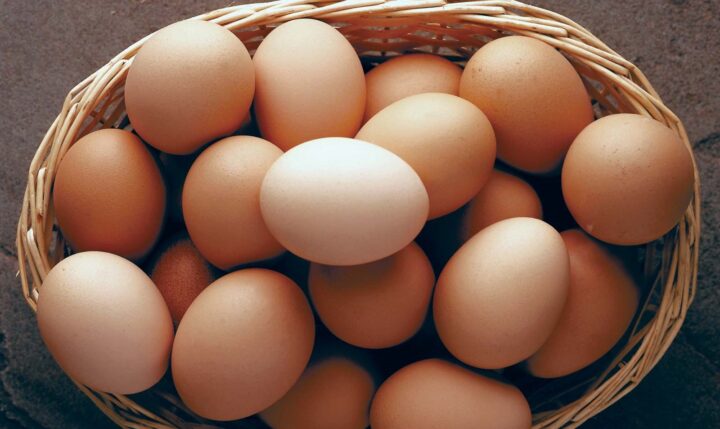
Eggs, butter, white bread: 9 foods that are wrongly demonized
Just enjoy – for many, this is hardly possible in terms of nutrition. Health hazards are lurking everywhere: too much gluten, too much fat, too much cholesterol. But the fear of certain foods is unfounded in many cases.
Diet errors persist. Science can still refer to facts so much. Once a food has a reputation as a health hazard, it’s hard to get rid of it. Some of the accused are to be rehabilitated here.
1. Bread
Bread has been viewed as a bad idea for some time for two reasons: carbohydrates and gluten. The lighter the bread, the more these carbohydrates are pure fatteners. A slice of white bread doesn’t fill you up for as long as a slice of rye bread. On the other hand, wheat bread has fewer calories than the same amount of whole grain.
The frowned upon gluten is a sticky protein in various types of grain, especially a lot in wheat. About two percent of the population cannot tolerate this protein. You suffer from celiac disease. These people react to bread, pastries and pasta with sometimes severe digestive problems. For them, gluten-free products are a blessing.
However, many people buy the more expensive special bread who can tolerate gluten, but are convinced that it makes you tired, sluggish and fat. These gluten haters could treat themselves to bread in all its variety. Anyone who eats a healthy diet can occasionally eat white bread – without worrying about gluten, carbohydrates or “excessive” calories.
2. Butter
The animal fat for spreads and fine cuisine is considered a fattening agent and source of cholesterol. In fact, 100 grams of butter has 740 kilocalories, which is slightly more than vegetable fats. Butter also contains mostly saturated fats, which increase cholesterol levels.
But: A third of these fatty acids in butter have a structure that plays no role in blood lipid levels. It is also one of the few foods that contains the important vitamin D.
3. Eggs
Anyone who still goes without breakfast eggs because they see their arteries hardening with every bite does not know the more recent research results on the supposed cholesterol bomb.
It is true that there are up to 400 milligrams of cholesterol in a hen’s egg, but it does not directly turn into deposits in the blood vessels. Saturated and trans-fatty acids are largely responsible for high blood fat levels, while cholesterol from food – especially eggs – hardly plays a role.
4. Coffee
The caffeine kick gets the heart racing, promotes insomnia and is generally very unhealthy – there’s even an old children’s song for prejudice (C-A-F-F-E-E – don’t drink so much coffee…)
The truth is: With 400 milligrams of caffeine (four to five cups of coffee) every day, every adult is on the safe side, as studies have shown and the European Food Safety Authority confirms.
For some diseases, coffee even has a beneficial effect: The Epic study (European Prospective Investigation into Cancer and Nutrition) awarded the hot drink a protective effect against colon cancer and brain tumors. Coffee also seems to help protect against skin cancer. It can alleviate symptoms of Parkinson’s disease and reduce the risk of type 2 diabetes.
5. Milk
Adults should generally not drink milk because they cannot process its sugar – so argue the milk critics. But is the lactose it contains really indigestible for everyone?
Sugar is a natural part of milk. Most people tolerate it with no problems. However, 15 percent of Germans react with abdominal pain, flatulence and diarrhea. They lack the enzyme lactase, which breaks down milk sugar and makes it digestible. This is how the lactose gets into the intestines, where it causes problems. Lactose intolerance is annoying but harmless. Everyone else can drink milk without hesitation anyway.
6. Sparkling mineral water
Sparkling mineral water is said to cause kidney stones, loosen calcium from bones and even attack tooth enamel. Blame it on the carbon dioxide.
Nonsense, say nutritionists. The carbonic acid and the sparkling bubbles are created from the mix of carbon dioxide and water. But this has no harmful effects. At best, people with a sensitive stomach should avoid carbonic acid. Since it promotes the formation of gastric juice, they often have to belch sourly.
On the positive side of bubbling mineral water is: It stimulates the flow of saliva and blood circulation in the oral and gastric mucosa, fills the stomach and reduces hunger.
7. Sweetener
The worst accusation against sweeteners is: carcinogenic. According to the German Society for Nutrition and the American FDA (Food and Drug Administration), there is no reliable evidence for this. Unlike sugar, sweeteners don’t provide food for tooth decay-causing bacteria, so they protect teeth, and they’re zero-calorie, so they help with weight loss.
In addition, however, the study situation is contradictory: sometimes sweeteners are said to curb appetite, sometimes trigger cravings – although the sugar substitute has no effect on blood sugar levels.
8. Salt
The popular belief is that salt raises blood pressure to unhealthy levels and is responsible for numerous heart attacks and strokes. In fact, every time we eat salty food, blood pressure rises. But he’s back to normal right away. Not so with the estimated third of people who react strongly to table salt and develop high blood pressure as a result.
For everyone else, the salt-free diet is dangerous: a lack of chloride, a second component of salt alongside sodium, can lead to cardiovascular problems.
9. Fish
Too much dangerous mercury and dioxin – this is the warning about fish from the (increasingly polluted) sea.
In fact, the poison accumulates to a critical concentration only in large predatory fish, such as sharks or marlins. In smaller fish, between salmon and tuna size, this is not a problem. At least that’s what the American Food and Drug Administration (FDA) says. If you want the valuable omega-3 fatty acids from freshly caught fish without the risk of poisoning, you should use sea creatures from certified breeding and aquaculture.
Categories: General
